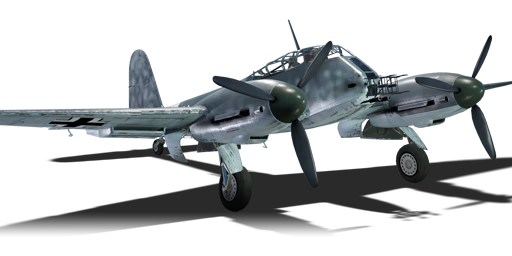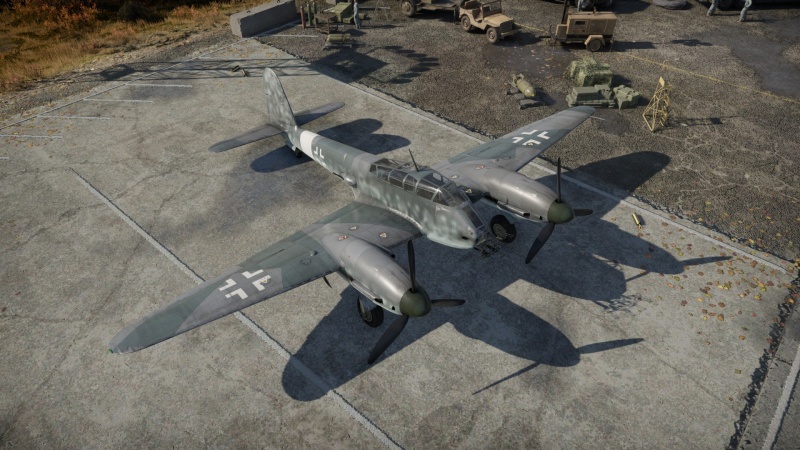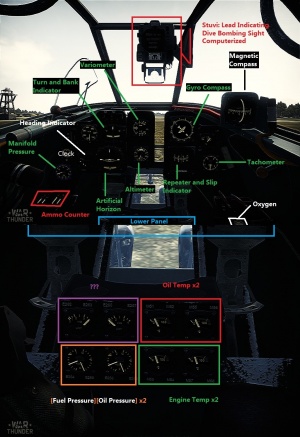Me 410 B-6/R3
| This page is about the German strike aircraft Me 410 B-6/R3. For other versions, see Me 410 (Family). |
Contents
Description
The Me 410 B-6/U3 was the naval variant of the Zerstӧrer. Its main mission was to escort German warships and vessels like the U-boat arm. For communication purposes, the FuG 200 “Zaunkӧnig” radio system was used to help talk to U-boats. In addition to the two MG 151 cannons, two MK 103 30 mm cannons were also fitted. Only a handful were actually produced so their impact was negligible; especially when the Germans lost France. Me 410 B-6s were then relegated to rescue missions and a few were found by the British.
The Me 410 B-6/R3 has been in the game since the start of the Open Beta Test prior to Update 1.27. It features a deadly set of cannon armament all mounted in the nose as well as two turrets for defensive purposes. With the armoured target belt, the MK 103 can easily penetrate through the engine decks of many tanks. It also retains the same armour and engines as the previous Me 410 variants. Unfortunately, this means the performance is still lacklustre and leaves Me 410 pilots vulnerable to enemy aircraft. Although it's armed with two 13 mm machine gun turrets, they have limited firing angles and enemy aircraft have to be in a very narrow position for both turrets to be utilized.
General info
Flight performance
| Characteristics | Max Speed (km/h at 6,900 m) |
Max altitude (metres) |
Turn time (seconds) |
Rate of climb (metres/second) |
Take-off run (metres) | |||
|---|---|---|---|---|---|---|---|---|
| AB | RB | AB | RB | AB | RB | |||
| Stock | 598 | 582 | 32.2 | 33.2 | 8.1 | 8.1 | 520 | |
| Upgraded | 644 | 620 | 29.9 | 31.0 | 14.0 | 10.8 | ||
Details
| Features | ||||
|---|---|---|---|---|
| Combat flaps | Take-off flaps | Landing flaps | Air brakes | Arrestor gear |
| ✓ | ✓ | ✓ | ✓ | X |
| Limits | ||||||
|---|---|---|---|---|---|---|
| Wings (km/h) | Gear (km/h) | Flaps (km/h) | Max Static G | |||
| Combat | Take-off | Landing | + | - | ||
| 457 | 428 | 280 | ~12 | ~4 | ||
| Optimal velocities (km/h) | |||
|---|---|---|---|
| Ailerons | Rudder | Elevators | Radiator |
| < 360 | < 360 | < 460 | > 265 |
| Compressor (RB/SB) | ||
|---|---|---|
| Setting 1 | ||
| Optimal altitude | 100% Engine power | WEP Engine power |
| 5,750 m | 3,120 hp | 3,551 hp |
Survivability and armour
- 8 mm steel - front of cockpit (either side of the glass)
- 5 mm steel - wings leading edge (in front of fuel tanks)
- 8 mm steel - prop hub and gear bay
- 9 mm steel - top and bottoms of wings (around the liquid cooling system)
- 8 mm steel - plates in the tail
- 8 mm steel - bulkhead aft of gunner
- 8 mm steel - between gunner and pilot
- 12 mm steel - pilot's headrest
- 60 mm bulletproof glass - in front of the pilot (inside aircraft)
Modifications and economy
Armaments
Offensive armament
The Me 410 B-6/R3 is armed with:
- 2 x 30 mm MK 103 cannons, chin-mounted (120 rpg = 240 total)
- 2 x 20 mm MG 151 cannons, fuselage-mounted (350 rpg = 700 total)
Defensive armament
The Me 410 B-6/R3 is defended by:
- 1 x 13 mm MG 131 machine gun, 2 x beam turrets (450 rpg)
Usage in battles
The Me 410 B-6/R3, unlike its predecessors, has two 30 mm cannons in addition to the regular 20 mm cannons found on any Me 410. However, the 7.92 mm machine guns have been removed from the aircraft. With the 30 mm ammunition belts modification, the 30 mm cannons combined with HVAP-T belts make short work of light pillboxes, light and medium tanks, and even heavy tanks if hit on the side or back. Due to this, your primary goal should be unlocking the (Tier III) 30 mm ammunition belts.
The "Hornisse" is most well suited for bomber hunting due to its heavy armament. The aircraft can even use BnZ tactics against other aircraft, provided there is enough altitude. If you are planning to do aerial combat, be sure to side climb, as the 410's climb rate is far from superior to the Spitfires and Bearcats you will face. It is also equipped with airbrakes, which is quite unusual for an aircraft of its size and role. As with any plane, it is inadvisable to attack a bomber by sitting on its tail. It is advisable that you key-bind the 20 mm and 30 mm cannons separately if you are going for the CAS role it is well-suited for. Binding different buttons to fire the cannons separately can conserve a lot of ammo, as you can discriminate between which calibre to use when going after heavily-armoured or lightly-armoured targets. When choosing to go for the role of an interceptor, it is important (though you do not need too) that you cue the 30 mm and 20 mm together, as it will make much more of a difference in the 1-3 seconds worth of a good deflection.
Radars
The Me 410 B-6/R3 is equipped with a FuG 200 search radar, located in the nose of the aircraft. The control box which is part of the radar damage model is located behind the pilot.
| FuG 200 - Target Detection Radar | |||
|---|---|---|---|
| Maximum Detection Range |
Guaranteed Detection Range |
Max Azimuth Scan Angle |
Max Elevation Scan Angle |
| 20,000 m | UT | ±60° | ±30° |
Manual Engine Control
| MEC elements | ||||||
|---|---|---|---|---|---|---|
| Mixer | Pitch | Radiator | Supercharger | Turbocharger | ||
| Oil | Water | Type | ||||
| Not controllable | Controllable Auto control available |
Not controllable Not auto controlled |
Controllable Not auto controlled |
Combined | Not controllable 1 gear |
Not controllable |
Pros and cons
Pros:
- Devastating high-velocity firepower with plentiful ammunition, is able to rip through any aircraft or vehicle in a short burst
- The defensive armament consists of two 13 mm machine guns, which can effectively chew through any aircraft's engine block
- Extremely versatile, can switch between CAP and CAS roles effectively
- The rear turrets have excellent coverage, covering almost all attacks from the rear of the aircraft
- Armour protects vital areas, such as the tail gunner, radiators, engines, and leading edges of the wing
- Has access to a target detection radar
- Is equipped with airbrakes, allowing for tighter turns and steeper dive angles
- Accelerates quite fast, especially in level flight
- Engine power is sufficient that it can fly on one engine
- Engines will cool down slowly even when the throttle is 100%
- Does not lose a significant amount of energy during manoeuvres
- Low-speed manoeuvring is impressive for the plane type due to slats
- Starts flying in a match with an air spawn
Cons:
- Large target
- Limited pilot protection, the pilot's torso and chest areas are not protected by armour
- Rate of climb is impairing
- Enters compressibility all too often when reaching 350 mph (563 km/h)
- Lacks effective ground attack without 30 mm HVAP
- No payload options
- Below mediocre maneuverabilty, especially roll rate, when compared to its rivals
- Tends to pitch up when extending flaps, can be deadly while landing
History
| Archive of the in-game description | |
|---|---|
|
In addition to the main Me 410 B modifications, a number of special-purpose variants of the Hornet were created for maritime operations. The anti-ship Me 410 B-6/R3 modification was equipped with a FuG 200 Hohentwiel patrol radar system and a suspended WB 103 container with two 30 mm Rheinmetall-Borsig MK 103 cannons. Also, several Me 410 B-2/U3 planes received a FuG 200 radar, with the nose-mounted 13 mm Rheinmetall-Borsig MG 13 machine guns removed. The Me 410 B-5 maritime attack aircraft, with glide bombs (BT-Körper) as its main weapon, was to become the most significant Me 410 variation for sea operations. The bombs could only be suspended externally: two 400 kg BT 400s under the fuselage or up to six 200 kg BT 200s (two bombs under the fuselage and four under the wings). The aircraft was equipped with a FuG 200 radar and two 20 mm Mauser MG 151/20 cannons. The 13 mm Rheinmetall-Borsig MG 131 machine guns, both in the nose section and in the remote-controlled FDL 131 mobile mounts, were removed. The bomb bay was not used as a bomb bay and instead had an extra 650-litre fuel tank mounted inside. Instead of BT bombs, the Me 410 B-5 could carry a 900 kg LT5b aerial torpedo, a 760 kg LT5i, or a 1,800 kg SC 1800 bomb. When a SC 1800 was included, the fuel tank was removed from the bomb bay. Other types of anti-ship weapons were also tested on the Me 410 B-5, such as the 800 kg SB 800RS bouncing bomb or the 1,000 kg SB 1000/400 bomb, with a decreased diameter designed to reduce drag. The bomb was stabilized by a braking parachute upon its being dropped. In May 1943, the first Me 410s appeared in the front line in Tunisia. In June 1943, the Hornets took part in raids over Britain. Beginning in April 1944, they were used by the German Air Defence Force. Although the Me 410 was superior to the Bf 110 in its performance characteristics, most of all in its speed and flight range, it was inferior as far as versatility was concerned. The Me 410's production was discontinued in September 1944. By this time, 1,160 machines were built in all versions, including bombers and scouts. It should be noted that some aircraft were redesigned Me.210s whose construction had not yet been completed. | |
Media
- Skins
- Videos
See also
Links to the articles on the War Thunder Wiki that you think will be useful for the reader, for example:
- reference to the series of the aircraft;
- links to approximate analogues of other nations and research trees.
External links
| Germany strike aircraft | |
|---|---|
| Messerschmitt | |
| Bf 110 | Bf 110 C-6 · Bf 110 C-7 · Bf 110 F-2 · Bf 110 G-2 · Bf 110 G-4 |
| Me 410 | Me 410 A-1 · Me 410 A-1/U4 · Me 410 B-1 · Me 410 B-2/U4 · Me 410 B-6/R3 |
| Dornier | |
| Do 335 | Do 335 A-0 · Do 335 A-1 · Do 335 B-2 |
| Focke-Wulf | |
| Fw 190 | Fw 190 F-8 |
| Heinkel | |
| He 219 | He 219 A-7 |
| Henschel | |
| Hs 129 | Hs 129 B-2 · Hs 129 B-2 (Romania) · Hs 129 B-3 |
| Junkers | |
| Ju 87 | Ju 87 G-1 · Ju 87 G-2 |
| Foreign: | |
| USSR | ▀IL-2 (1942) |






